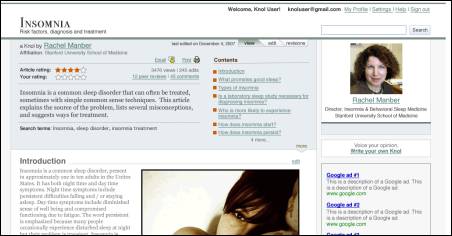Friday, December 14, 2007
Google Knol
“Knol”, just announced at the official Google blog, is a currently private, invitation-only knowledge sharing service (update July 2008: it’s live now at knol.google.com). Google says that a Knol is a “unit of knowledge,"* and in the style of the old-school About.com website, experts are invited to the service to write an introductory article on a subject of their expertise. Google wants to provide all the tools to write this, and host the content and so on, so that experts can focus just on the content. Then, ad revenues those pages generate can be shared.
Knol pages will be made available for indexing by search engines, Google announced, including appearing in Google search itself. Google’s Udi Manber says, “Our job in Search Quality will be to rank the knols appropriately when they appear in Google search results.” (It’s not 100% clear from that statement if Google will treat Knol pages as just another organic web source, or give them some kind of special onebox, or special organic result formatting.)
Also, Knols can be released under a Creative Commons license, if the screenshot** is right. It’s good to see Google finally starting to utilize this type of licensing (as many of their services still lack it).
Group efforts vs single authors
One key aspect of Knol, according to Google’s Udi Manber, is that the authors of articles will be prominently displayed:
Books have authors’ names right on the cover, news articles have bylines, scientific articles always have authors – but somehow the web evolved without a strong standard to keep authors names highlighted. We believe that knowing who wrote what will significantly help users make better use of web content.
That’s partly a strawman argument – author names are included in many blog posts and news articles already today. However, if Udi is talking about Wikipedia, he may have a point.
On systems like Wikipedia, which already serves great introductory articles for a multitude of subjects, the page is a true group effort with no single author being credited as lead. Knols (one knol, two knols...?) seem to take a different route. This could become a problem with Knol, too: if a single author takes the lead, and all edits must go through that person, the article may not end up as fact-checked and up-to-date as a Wikipedia counterpart may. Even with peer reviews and potential edit suggestions that may be submitted to the author – the screenshot provided by Google, as pictured above, Wikipedia-style “Edit” links, and Google says people will be able “to submit comments, questions, edits, additional content” – the incentive to edit someone else’s article may be much lower than to help edit an article that is disclosed to be a real group project.
Then again, Knol seems to want to offer incentive for experts in terms of recognition, and money as well, two aspects lacking in Wikipedia. Also, if projects like Wikipedia get some good large-scale competition, it might help Wikipedia too. At this time, Wikipedia’s editing tools for instance are somewhat cluttered and don’t have the best usability. If Google takes away experts from Wikipedia because they provide easier tools, then maybe it helps improve Wikipedia in return.
(Not that experts of a subject would really need a new service badly – they can already create a website on their domain using a variety of tools, and throw in some ads. What may make Knol better for this, depending on how well it’s implemented, is the kind of tool set offered for editing... and potentially, the way Knol results are highlighted in search results. For those who care about search results neutrality, that part may become an area to watch in the future.)
Google claims they won’t be playing moderator
In terms of what content is appropriate for the Knol project, Google claims “Google will not serve as an editor in any way, and will not bless any content.” Past projects of this nature at Google have shown however that is not completely the case; there’s usually a policy disallowing certain content, sometimes leading to banned pages... think Google Page Creator, Blogger, or Google Groups***.
One of the last times Google tried to unite experts around the world for a project of theirs was for Google Answers, a paid Q&A service that has been canceled in the meantime. Let’s see how “Knol” fares.
[Thanks Beussery and Mathias Schindler! Screenshot by Google.]
*Sounds more like the name of planet from a sci-fi novel. Not that that’s bad.
**If the screenshot’s fonts are indicative of the final layout, I think the main text is too small.
***Quote from the Google Groups terms of service: “If Google discovers Content that does not appear to conform to the Terms of Service, Google may investigate and determine in good faith and in its sole discretion whether to remove the Content.”
>> More posts
Advertisement
This site unofficially covers Google™ and more with some rights reserved. Join our forum!

